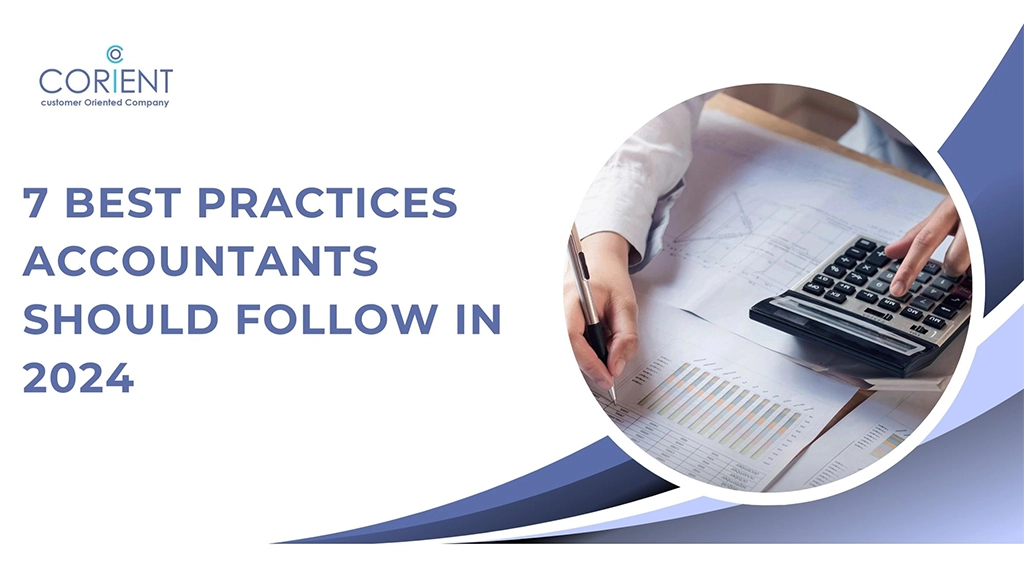
7 Best Practices Accountants Should Follow in 2024
In the ever-evolving world of finance, accountants stand as the gatekeepers of financial wisdom, guiding businesses and individuals toward prosperity. The journey to financial excellence is a path paved with both opportunity and complexity. As new technologies and competitors reshape the landscape, the demand for adept accountants who can harness the power of best practices has never been greater.
Are you ready to embrace the future of accounting and steer your financial ship through these turbulent waters with confidence? Let’s navigate this exciting terrain together and ensure your financial success remains unwavering in the face of innovation and competition.
1. Give Focused Attention On Your Clients Who Deserve Most
In the ever-evolving landscape of the accounting profession, optimizing client relationships and resources is paramount to achieving excellence. Services delivered to clients should be tailored, high-quality services that not only meet but exceed expectations. To achieve this, once can implemented a strategic client categorization system that places clients into three distinct categories: A, B, and C.
A Category clients are the cornerstone of any practice. They are the clients who not only value expertise but also compensate fairly for services. These clients require less time and effort, allowing us to provide them with exceptional service and prompt attention to their financial needs.
In the B Category, these are emerging clients with tremendous growth potential. These clients may not yet pay the highest fees, but they represent promising opportunities for long-term partnerships. By nurturing these relationships and providing valuable guidance, you can aim to help them thrive and eventually move into the A Category.
Lastly, C Category clients, while valued, may require disproportionate time and resources for the fees they contribute. To ensure you continue to deliver top-tier services to A and B Category clients, you can make the difficult decision to part ways with some C Category clients allowing you to reallocate resources more efficiently.
By strategically categorizing clients, you can focus on expertise where it matters most, ensuring that A and B Category clients receive the exceptional service they deserve while also fostering the growth of emerging businesses. This commitment to optimizing client relationships is at the core of mission to provide the highest level of accounting services in a rapidly changing financial landscape.
2. Seamless Operations Through Workflow Management
In today’s fast-paced business environment, it’s increasingly important for accountants to adopt a proactive approach in managing their clients’ workflows. Instead of waiting for clients to initiate contact, accountants can significantly enhance efficiency and client satisfaction by reaching out first.
A strategic move is to send email reminders immediately after filing Quarter 4 VAT returns, followed by timely phone calls. This approach ensures clients are aware of upcoming deadlines and necessary actions. Additionally, accountants can leverage online accounting applications to monitor bookkeeping status, promptly identifying any missing information. By sending clients a comprehensive list of required documents and data, accountants can streamline the accounting process.
Achieving a 50% success rate in completing accounts within 90 to 120 days of the fiscal year-end can dramatically reduce anxiety during crunch times. This efficiency not only eases the year-end rush but also opens up opportunities for accountants to engage in more proactive consulting.
By staying ahead of the curve, accountants can provide exceptional value to their clients, transforming the traditional reactive model into a dynamic, client-centric approach.
3.Fix Key Performance Indicators For Measuring Success
In your commitment to delivering top-tier services to your clients, it’s crucial to have a reliable method for assessing your performance. This is where Key Performance Indicators (KPIs) become invaluable. To effectively measure and enhance your service quality, start by identifying the most relevant KPIs for your practice. These could include metrics like the
- Recovery rate per hour
- Cost per hour,
- Percentage of accounts filed within 90 days
- VAT returns completed within 25 days
- Management accounts sent to clients within 20 days can significantly contribute to ensuring timely service delivery
By consistently monitoring these KPIs, you’re not just keeping track of your performance; you’re also identifying potential areas for improvement. This approach enables you to deliver services promptly, meet client expectations, and continually refine your processes for even greater efficiency and client satisfaction.
4. Incorporating Technology and Its Integration
Clients today are not just looking for satisfactory services; they increasingly demand quicker and more precise solutions. To meet and exceed these evolving expectations, it’s crucial for businesses to embrace and integrate cutting-edge technologies into their operational framework. Utilizing innovative software such as Xero, QuickBooks, Dext, Senta, Glide, Hubdoc, and Spotlight/Fathom, among others, can revolutionize your workflow, significantly boosting efficiency and productivity. The key lies in selecting technologies that not only seamlessly integrate with your existing systems but also contribute to streamlining processes. By adopting these advanced tools, you can offer services that are not just fast and accurate but also more aligned with the dynamic needs of your clients. This strategic technological integration is not just an upgrade; it’s a necessary step to stay competitive and responsive in the ever-evolving business landscape.
![]()
![]() 5. Bookkeeping Practices
5. Bookkeeping Practices
Accurate bookkeeping is a cornerstone of financial stability and is essential for making well-informed decisions. To achieve this, it’s crucial to adopt effective bookkeeping practices. One of the key steps is to establish a robust system for gathering precise financial information. This system should ensure that all financial transactions are recorded accurately and in a timely manner. Additionally, setting and adhering to regular deadlines for reconciling bank statements is imperative. This practice not only maintains the integrity of financial records but also provides a reliable foundation for analyzing financial health and making strategic decisions. By prioritizing these bookkeeping practices, businesses can ensure a stable financial footing and make decisions based on solid, accurate financial data. If this task is burdensome you can avail the bookkeeping outsourcing services of an accounting service provider.
![]()
![]() 6. Maintaining Employee Performances
6. Maintaining Employee Performances
Your employees are the ones who offer client services, and they must updated with new trends in the market and be aware of the goals and deadlines. It can be done by regularly conducting weekly workflow meetings, monthly KPI meetings, and quarterly improvement meetings. Through weekly workflow meetings, you can discuss deadlines and tasks at hand. Monthly KPI meetings are for reviewing performances against KPIs, and any challenges in achieving them can be addressed in quarterly improvement meetings. These meetings let you and your employees be on one page concerning goals.
![]() 7. Practice Dashboard for Real-Time Overview
7. Practice Dashboard for Real-Time Overview
Incorporating a centralized dashboard gives you a real-time overview of the practice. It will enable you to smoothen communications and business development. Also, implement specific indicators in the dashboard for early warning to identify issues as early as possible. To summaries, a dashboard helps manage practice operations and aids in efficient decision-making.
Conclusion
Accountants can stay ahead in a competitive environment by focusing on priority clients, streamlining workflow, KPIs, incorporating new techs, employee meetings, bookkeeping practises, and a central dashboard. However, implementing these changes yourself can be a tough nut to crack. You will need to hire and train employees, upskill them regularly, and keep them updated with the latest trends and changes in the accounting field. All this comes at a price and diverts your resources from core business activity. You can avoid this by delegating these tasks to Corient Business Solutions, an accounting outsourcing provider.

